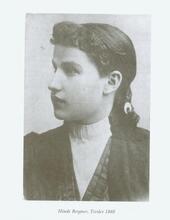Edna: Apocrypha
In the Book of Tobit, Edna is Raguel’s wife, Sarah’s mother, and the mother-in-law of Tobias, Tobit’s son. Edna has no biblical namesake. Perhaps the author of Tobi means to recall Eden’s idyllic existence, or, more likely, to convey by the name something about the type of woman, wife, and mother Edna is. Edna is a matriarch of a harmonious household, an agreeable but not silent partner, a loving mother, and a gracious host. She fits into her patriarchally defined role while gently nudging its limitations.
Article
In the Book of Tobit, Edna is Raguel’s wife, Sarah’s mother, and the mother-in-law of Tobias, Tobit’s son. Edna has no biblical namesake; unlike the other women named in Tobit (Anna, Deborah, Eve, Sarah), her name does not evoke images from the Hebrew Bible. Perhaps the author of Tobit means to recall Eden’s idyllic existence, or, more likely, to convey by the name something about the type of woman, wife, and mother Edna is.
What makes Edna a “delight” may be her deportment within her family. One cannot help comparing Edna with Anna, the other matriarch in Tobit. Both women are devoted mothers and good wives, but unlike Anna, Edna never appears outside the home or argues with her husband. She does what her husband asks (Tob 7:13, 15; 8:12, 19) and seems to be always in accord with him. Raguel, in turn, treats her as his partner, not his servant (Tob 8:21). On her daughter’s wedding night, Edna encourages Sarah (Tob 7:16), who has reason to be apprehensive (Tob 3:8). She welcomes Tobias, whom she has just met, into her family as a son (Tob 10:12). The author may want readers to see Edna as the ideal wife and mother and chooses her name as a hint to that effect.
Edna operates only within the home and almost exclusively in conjunction with her husband. Although the text mentions Raguel twice (Tob 3:7; 6:11) before Tobias and his companion arrive in Ecbatana, the reader first encounters Edna only when the guests come to her house (Tob 7:2). Whenever Edna appears in the story, she is usually either in the company of Raguel (Tob 7:8; 8:21; 14:13) or Sarah (Tob 7:16), or doing something Raguel has told her to do (Tob 7:13, 15; 8:12, 19).
However, there are unexpected, if small, challenges to the patriarchal view that Edna’s subordination to her husband upholds. Edna, not Raguel, interviews their guests, even though Raguel is present (Tob 7:2–8). According to one manuscript tradition, she may also have actively participated in the signing of her daughter’s marriage contract; the Greek says, “they set their seals to it” (Tob 7:13; emphasis added). This would give Edna a larger part in the proceedings than does the other manuscript tradition, in which she merely fetches the scroll for her husband. Finally, she blesses Tobias at the newlyweds’ departure, performing a function rarely associated with biblical women (Tob 10:12).
If the meaning of Edna’s name indeed reflects her character, then her charm stems from both the way she fits her patriarchally defined role and the way she gently nudges its limitations. Matriarch of a harmonious household, she is an agreeable but not silent partner for her husband, a loving and supportive mother, a warm mother-in-law and a gracious host—all delightful aspects.
Bow, Beverly, and George W. E. Nickelsburg, “Patriarchy with a Twist: Men and Women in Tobit.” In “Women Like This”: New Perspectives on Jewish Women in the Greco-Roman World, edited by Amy-Jill Levine, 127–143. Atlanta: 1991.
Meyers, Carol, General Editor. Women in Scripture. New York: 2000.










